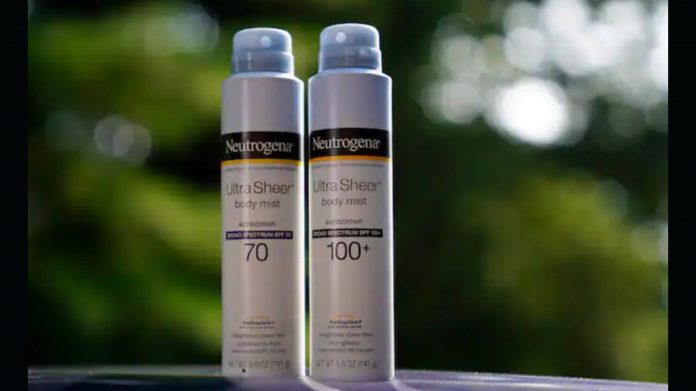The Prices and Consumer Affairs Division is alerting the public that Johnson & Johnson Consumer Inc. (JJCI) is voluntarily recalling five NEUTROGENA® and AVEENO® aerosol sunscreen product lines at the consumer level. Internal testing identified low levels of benzene; a chemical linked to blood cancers such as leukemia in some samples of the products.
The recall involves four Neutrogena sunscreen versions — Beach Defense aerosol sunscreen, Cool Dry Sport aerosol sunscreen, Invisible Daily Defense aerosol sunscreen and Ultra Sheer aerosol sunscreen — and Aveeno Protect + Refresh aerosol sunscreen. The health-care giant said in a statement that though using the products “would not be expected to cause adverse health consequences,” it voluntarily decided on the recall “out of an abundance of caution.”
“While benzene is not an ingredient in any of our sunscreen products, it was detected in some samples of the impacted aerosol sunscreen finished products,” Johnson & Johnson said, adding that the recall was for all SPF levels and sizes.
The company did not disclose the levels of benzene detected in its testing, but said in its statement that, based on exposure modeling and Environmental Protection Agency guidance, “daily exposure to benzene in these aerosol sunscreen products at the levels detected in our testing would not be expected to cause adverse health consequences.”
The recalled sunscreen products are packaged in aerosol cans, and consumers should stop using these specific products immediately.
Benzene, a component of gasoline and a frequently used solvent for rubber and waxes, is highly flammable. According to the Centers for Disease Control and Prevention (CDC), long-term and repeated exposure to the chemical at high enough levels can cause leukemia or other cancers.
The carcinogen’s effects vary depending on whether it is ingested, inhaled, or gets on a person’s skin. Symptoms include irregular heartbeat and dizziness, but the highest levels of exposure can also lead to death.
The local Consumer affairs division is urging consumers to contact their physician if they have any questions, concerns or have experienced any problems related to using these aerosol sunscreen products.

